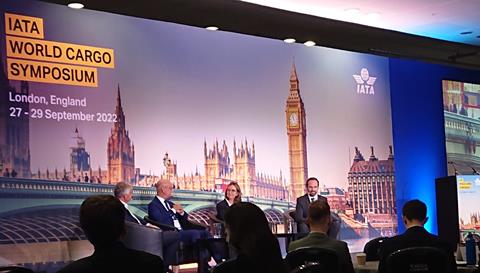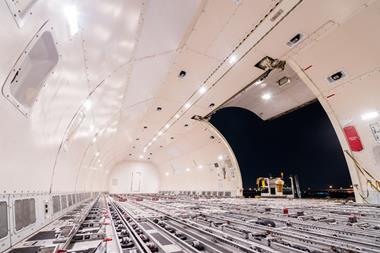
Integrated logistics can play a key role in adding value and efficiency for shippers but airfreight and oceanfreight will remain "distinctly different", air cargo leaders have concluded.
A panel discussion on day one of the IATA World Cargo Symposium (WCS) discussed the impact of new entrants from outside the industry to the airfreight market.
Reflecting on the launch of CMA CGM Air Cargo earlier this year, Olivier Casanova, chief executive of the new entrant, noted “there is more need for integration of different supply chain players”.
He added: “The more complex the supply chain, the more expertise is required to manage each part of this chain and how they interconnect to optimise services and solutions.”
However, each chain in the link also has its own role to play.
He said that airfreight works differently to shipping and freight forwarders add value and provide services that carriers cannot.
Since the pandemic started, Casanova said CMA CGM has seen an increase in freight forwarders contracting for capacity.
It was also questioned whether new entrants may be less keen on air cargo when rates come down from their current highs.
Dorothea von Boxberg, chief executive of Lufthansa Cargo, said that the airfreight market may become less attractive to freight forwarders when rates drop.
“It’s a lot more complicated to make the business profitable throughout the cycle of market ups and downs. It requires a lot of knowledge systems and investments.”
Michiel Greeven, executive vice president, DHL Express, said that customers are not necessarily seeking integrated logistics but rather reliability, consistency and speed.
“We cannot offer completely integrated solutions,” added Greeven. “It’s simply too complex and probably not possible.”
Casanova believes airfreight and oceanfreight will remain distinctly different, despite integration between the transport modes.
Von Boxberg agreed that the markets will remain separate but pointed out that when one mode cannot offer everything a shipper needs, freight forwarders can look to integrated logistics.
The panel also noted that cargo airlines have not significantly invested in other logistics modes.
Von Boxberg said that the focus of investment continues to be in their fleets and digital rather than branching out into other modes.
“There are a lot of old freighters out there that need to be renewed over time. Digitalisation doesn’t cost quite so much but it is still an investment that is needed.”
She said that while the current air cargo market isn’t consolidated, there will likely be some digitalisation consolidation, due to a number of smaller players.
The panel also looked at the growing influence of e-commerce volumes in air cargo.
Von Boxberg added that Lufthansa’s customers now include more e-commerce shippers.
The B2B e-commerce supply chain will become more streamlined with smaller shipments going to the end customer, believes Greeven.
Casanova believes that while e-commerce growth is changing the industry and e-commerce businesses are embracing integrated logistics, “there is still room in the industry for traditional air cargo players".
The panel agreed that sustainability is another area where collaboration between modes, and energy companies – jet fuel providers in the case of airfreight, is helpful.
“We need to find solutions together,” Casanova said.















